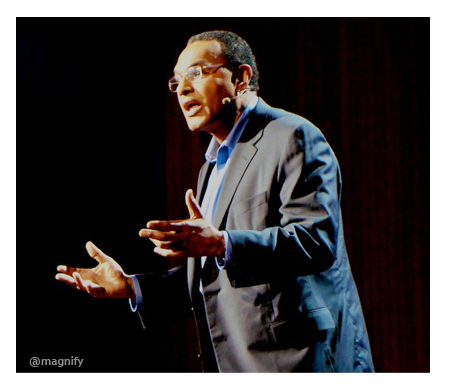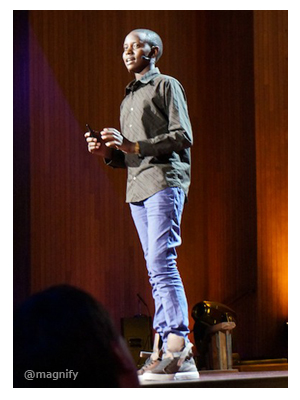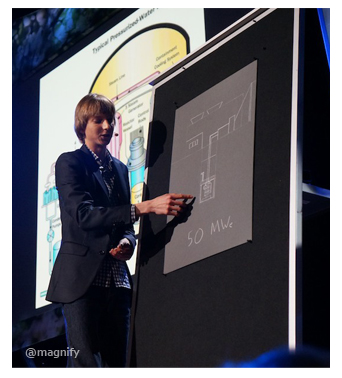It's easy to jump on the "Education is Broken" bandwagon. After all, our institutions seem to be behind the curve - as the world speeds up and embraces change.
At this year's TED Conference in Long Beach California - the answers to the education question were very much on the table, even as the solutions proposed seemed in some ways to be at odds with one another.
Six TED Talks orbited around education - providing a powerful glimpse into the complexity and opportunity that lies ahead.
The journey began with Freeman Hrabowksi, a passionate and charismatic educator whose journey began at age 12, when he marched in Martin Luther King Jr.'s "Children's Crusade." He was arrested - fighting for his right to a good education. In jail, Dr. King told them, "What you children do this day will impact children not yet born." Hrabowski learned at an early age "Children can be empowered to take ownership of their education."

Educational empowerment - a powerful theme.
Today Hrabowski is the President of the University of Maryland, Baltimore County (UMBC) - which has become a leading institution to teach science and engineering. He pointed to three things they do with students. Set high expectations. Building community among the students. Faculty that needs to be willing to get involved with the students, even in the classroom.
Hrabowski says many students are bored in class.UMBC addresses this with an emphasis on collaboration. Hrabowski explains it this way "If a student has a sense of self, it's amazing how their dreams and values can make all the difference in the world."
With that talk as the starting point, TED's Curators did something new, and magical. They filled the stage over the next three days with young people. Extraordinary young people. 
First there was Richard Turere, a 13 year old Maasai from Kenya. Turere, who was charged with caring for his family's cattle, had a problem. Lions were killing his herd. Richard invented "Lion Lights" - creating a pulsating ring of light to keep lions away at night "I used to hate lions," he said "Now I don't hate them anymore." Richard taught himself how to keep the peace between lions and his Kenyan family's survival.
Next was the brilliant 18 year old Taylor Wilson. Wilson build a nuclear reactor in his garage when he was just 15, making him the youngest person to achieve fusion. Wilson has forgone college, instead as one of the first recipients of the $100,000 Thiel prize, he's exploring nuclear fission. He thinks fission could solve our energy needs, and he's out to prove it.
Then, a bit later in the program - Miranda Wang and Jeanny Yao presented their discovery. These two Canadian teenagers discovered a bacteria in their local river that can break down plastics - and in particular phthalates, a compound that can harm human reproduction. Wang and Yao say biologically engineered organisms can clean up our environment by literally eroding our landfills.
And finally - the powerful story of 15 year old Jack Andraka. After he dealt with the death of his uncle from Pancreatic cancer, he became focused on finding a better test for the terrible disease. He came up with a plan, and reached out to 199 local college professors for their support. 198 rejected him, but Dr. Anirban Maitra at Johns Hopkins, agreed to support his research. The result was a new low cost test for pancreatic cancer. The test is over 90 percent accurate and inexpensive. He ended his TED Talk by saying: "For a 15-year-old who didn't know what a pancreas was - to detect pancreatic cancer, just think what you could do."
Then, with all of those presentations as a build up - Sugata Mitra took to the stage. He tossed aside the idea that schools are 'broken', saying instead: "Schools as we know them are obsolete." Wow - now that had the TED audience sitting bolt upright. He explained how the Victorians very successfully created a global 'computer' using people as parts: "It's called the bureaucratic administrative machine. In order to have that machine running, you need to have lots and lots of people. They made another machine to produce those people. It's called 'the school.' The schools would produce the people who would then become parts of bureaucratic administrative machine."
Mitra's story revolves around the idea that the web has give the world the access to knowledge people require to educate themselves. And he tells a riveting story of putting a computer in a hole he cut in the wall of a slum in Kalkaji, New Delhi. The children began to explore the computer - and teach themselves. Today, Mitra believes the future is in S.O.L.E. learning, Self Organized Learning Environment. His TED Talk is powerful, and thought provoking. It also won him the coveted TED Prize and a million dollars of funding to build his school in the cloud.
Says Mitra: "we need to look at learning as the product of educational self-organization. If you allow the educational program to self-organize, then learning emerges. It's not about making learning happen; it's about letting it happen."
